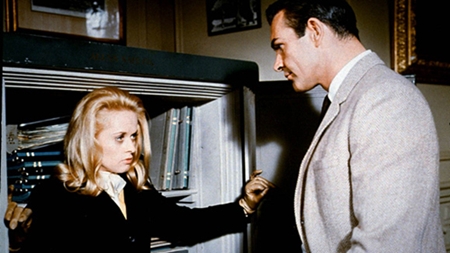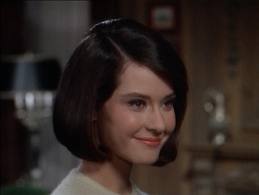By Film Noir Blonde
Marnie/1964/Universal Pictures/130 min.
 In honor of Tippi Hedren’s 86th birthday on Jan. 19, we are running a review of “Marnie.” In 1983, Hedren, a Minnesota native of Scandinavian descent, founded the Roar Foundation to support abandoned exotic felines at the Shambala Preserve in Acton, Calif.
In honor of Tippi Hedren’s 86th birthday on Jan. 19, we are running a review of “Marnie.” In 1983, Hedren, a Minnesota native of Scandinavian descent, founded the Roar Foundation to support abandoned exotic felines at the Shambala Preserve in Acton, Calif.
Most cynics have romantic souls and if there’s one Hitchcock film that works on this premise it’s “Marnie.” Though the legendary auteur frequently featured redemptive, romantic endings, here a pair of feuding lovers must work through many an issue before they hit happily ever after. It’s also a portrait of a wayward woman struggling with a tortured psyche, stemming from an unresolved childhood trauma.
In the opening scene we meet impeccably dressed, raven-haired career girl Marnie Edgar (Tippi Hedren) carrying a citron-colored handbag that’s as covetable today as it was in 1964. (Hedren starred in Hitchcock’s “The Birds” one year earlier.)
Marnie has just finished doing what she does best: stealing from her employer, then donning a new disguise so she can pull the same scam at another company.
Besides her sizable clothing and hair-color budget, Marnie wants money to give to her poor frumpy Mama (Louise Latham), telling her: “That’s what money’s for. To spend.” (Especially when it’s someone else’s cash.) But despite these handouts, which Marnie personally delivers, Mama’s uptight and hard to please, preferring to lavish her attention on a little girl from the neighborhood (Kimberly Beck) instead of on her daughter.
At her next job, Marnie sports auburn up-do’s and sensible shoes. It’s here that she meets devastatingly handsome businessman Mark Rutland (Sean Connery). Intense and domineering, Mark is quickly smitten but ice-queen Marnie has no interest in him or in any man, though she does weaken long enough to kiss him.
Not so impressed with Marnie is the sharp and sassy Lil (Diane Baker). Packed with interesting women, the cast also includes Mariette Hartley as Marnie’s office colleague and Melody Thomas Scott as young Marnie.
Marnie’s coldness just makes Mark more determined – he is used to getting what he wants – and once he finds out about her criminal past, he uses this info to hasten their marriage.
The fact that Marnie can’t stand his touch doesn’t make for the most romantic honeymoon. Perhaps if he were a tad less controlling …
Will Mark help Marnie confront her past before her spate of Dior-collar crime catches up with her? That’s the movie’s source of suspense. It’s loosely based on a novel by Winston Graham but Hitchcock typically used the literary source material as merely a starting point to create a tension-filled, sometimes terrifying, reality and render his unique vision. The script came from Jay Presson Allen, a former actress and writer, who also worked with Sidney Lumet.
Hitchcock enjoyed exploring psychosexual theory in his films, sometimes with a smirk, sometimes not. In this case, Dr. Hitch diagnoses frigidity, rescue fantasies, control issues bordering on obsession, repressed memories and of course a major power struggle.
The movie was trashed upon its release. Critics called Hitchcock sloppy and unfairly pounced on Hedren’s acting. The editing is occasionally choppy, some of the backdrops look fake, the screen goes red when Marnie sees the color red, there are thunderstorms aplenty. Though they might seem flawed or slightly old-hat, these noirish devices reflect Marnie’s off-kilter world, her confused and anguished psychological state.
And Hitchcock’s personality was too controlling and perfectionistic to have coasted through this movie. Conscious of every detail of every frame, he sometimes shopped for and selected accessories like hats and handbags because even these seemingly minor visual elements affected the color palette of each shot. He also wanted classic lines for the clothes so that in years to come they wouldn’t look dated.
Always engaging, sometimes thrilling, “Marnie” is a complex, thoughtful and satisfying story.












From FNB readers